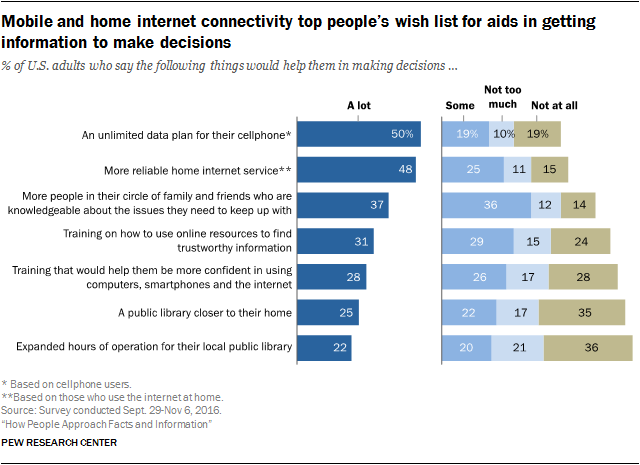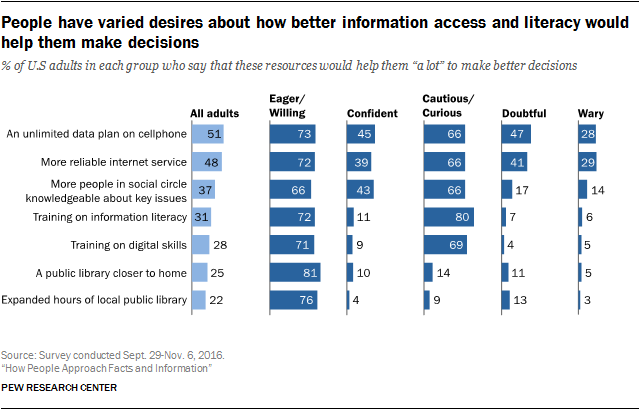One way to think about how people handle information demands is to examine their “wish list” of tools that might help them use information in making decisions. This produces some insight into the resources people say would help them cope with information demands.

The survey asked people the degree to which certain resources would contribute to them using information to make decisions in their lives. The list was: an unlimited data plan for their cellphones (50% say that would help them “a lot” in making decisions); more reliable home internet service (48% say that would help them a lot); friends in their social networks who know about the issues they were wrestling with (37% say that would help a lot); training in using online resources to find trustworthy information (31% say it would help a lot); training that would help them be more confident in their computer or smartphone use (28% say that would help a lot); a closer public library (25% say it would help a lot); and expanded hours of operation at their local library (22% say that would help a lot).
People’s answers to these questions often connected with their answers on their general levels of trust in information and interest in learning. For instance, the Eager and Willing are the most hungry for the variety of tools or resources that would help them use information better to make decisions. They are highly interested in training on digital skills or information literacy, as well as more reliable internet service or unlimited data caps. To an extent far greater than any other group, they say having a library with better hours or closer to their home would help them a lot in gathering information for decisions. They would also welcome more people in their social networks that are knowledgeable about issues they need to keep up with.

The other group that is particularly likely to say these tools would help them “a lot” is the Cautious and Curious. They share high levels of interest in various resources with the Eager and Willing, with the exception of easier access to libraries (either proximity or hours).
The Eager and Willing and the Cautious and Curious are also very likely to say that more reliable home internet service or higher data caps would help them a lot as they seek out information for decisions. These groups, in other words, represent tech consumers with strong awareness of the attributes of the information services they use – and a desire for something better. The Eager and Willing (22%) and the Cautious and Curious (13%) make up just over one-third of the adult population.
The Confident (16%) do not seem to have similarly high interest in resources that might help them cope with information flows. This could stem from the fact that this group is relatively well off financially and relatively assured that they know what they need to know and have what they need to have when it comes to digital tools and skills.
This leaves about half of the adult population (the Doubtful and the Wary) who are hesitant in dealing with information and who do not express interest in tools that might help them find what they need. They are not convinced that digital resources might aid them. This might also affect their capacity to engage with parts of the information society.
Many think libraries can help with information challenges
These findings complement previous Pew Research Center surveys about how people think about the role of libraries, particularly in helping meet the information needs of their communities. For instance, previous Center surveys have found that 80% of those ages 16 and above think libraries should offer digital skills training, especially for older adults and kids. Similar numbers (76% of those ages 16 and older) say libraries should definitely have programs to teach patrons about online privacy and security.
This new survey contained a battery of new questions about the ways libraries might contribute to people’s information needs. Majorities of Americans think libraries help them with information issues:
- 78% say their local library helps them find information that is trustworthy and reliable.
- 76% believe libraries help them learn new things.
- 65% argue that libraries help them grow as people.
- 56% maintain that libraries help them get information that helps them make decisions.




